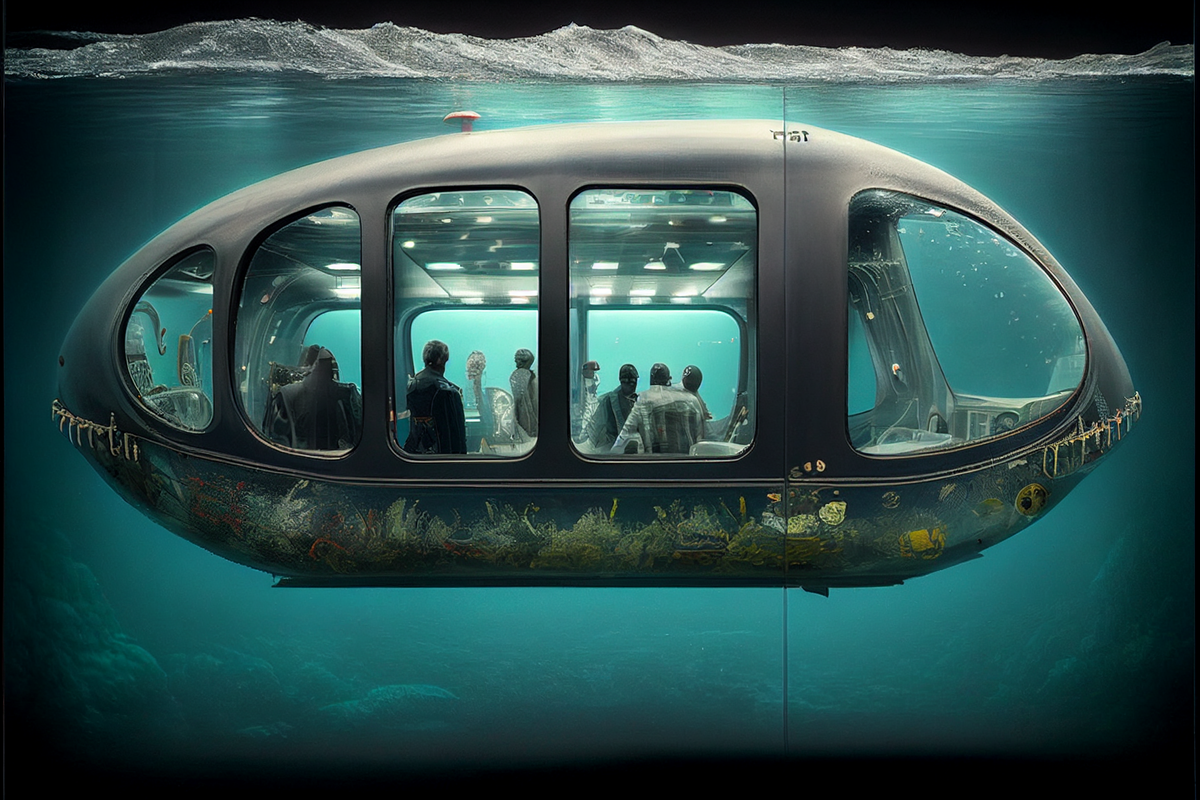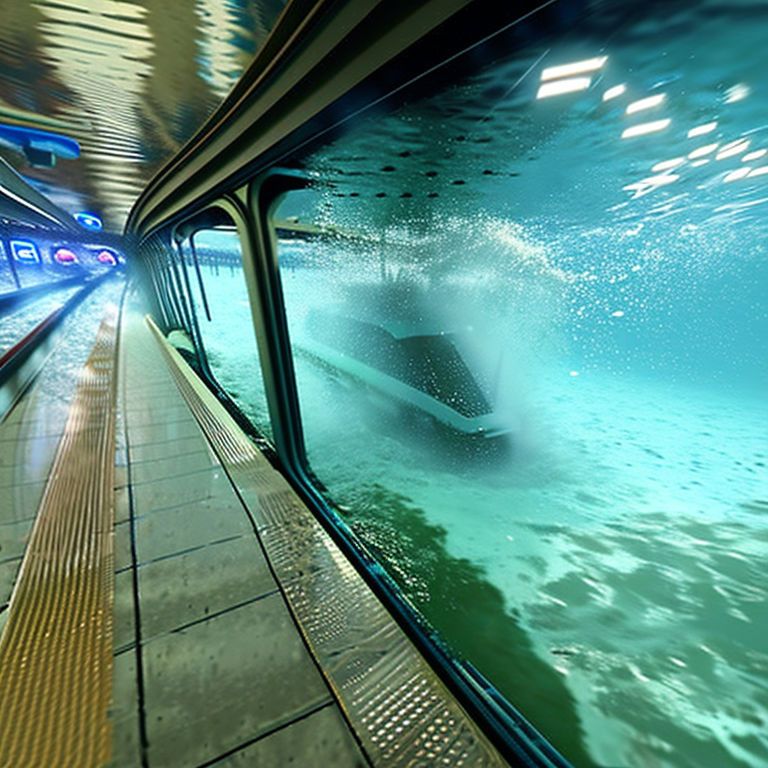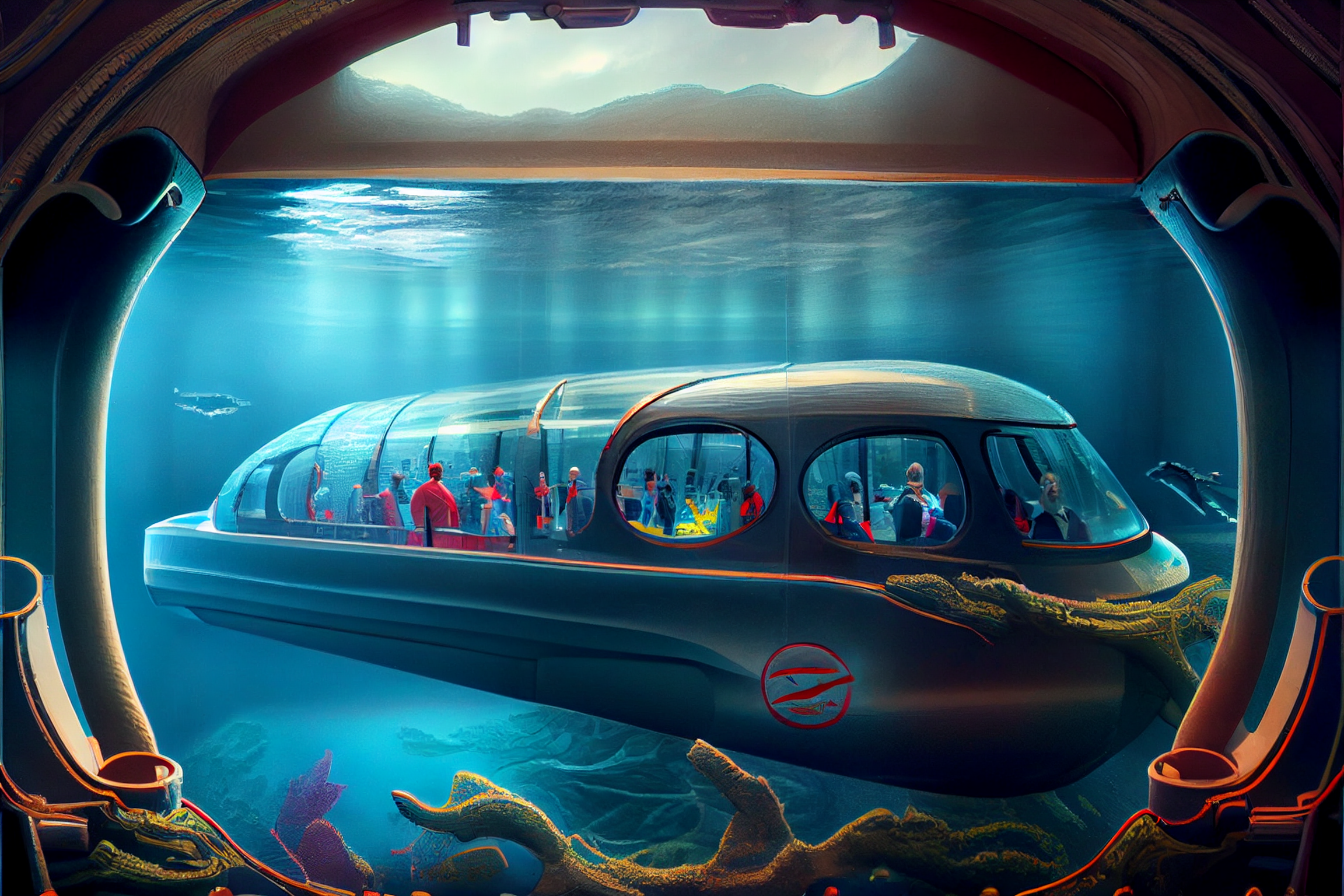Mr. Mohan Leela Shankar and India's First Underwater Bus
The underwater bus by Mr. Mohan Leela Shankar is an innovative fusion of cutting-edge technology and engineering prowess that will start a new milestone for India's transportation endeavors.

Special Note: This is a work of creative fiction
In the ever-evolving landscape of transportation, innovation knows no bounds. Mr. Mohan Leela Shankar, an esteemed AI veteran, is leading the charge in revolutionizing the way we commute by spearheading the development of India's first underwater bus.
With an ambitious goal to launch this groundbreaking mode of transport by 2030, Mr. Shankar is poised to transform the way people travel, connecting cities and unlocking new possibilities for India's transportation infrastructure.

Unveiling the Vision:
Mr. Shankar's vision for an underwater bus was born out of a desire to bridge the gap between land and water transportation, offering a seamless and efficient means of travel. With India's vast coastline and numerous water bodies, he recognized the untapped potential of utilizing these resources for transportation purposes. His deep knowledge of artificial intelligence and passion for sustainable transportation drove him to embark on this groundbreaking project.
Technological Marvel: The Underwater Bus
The underwater bus is an innovative fusion of cutting-edge technology and engineering prowess. This marvel of transportation leverages the latest advancements in AI, robotics, and materials science to ensure its feasibility and safety.
Design and Construction:
The design of the underwater bus incorporates a sleek, streamlined structure, optimized for hydrodynamics and efficiency underwater. Constructed using advanced lightweight materials, it guarantees buoyancy while maintaining structural integrity in the challenging underwater environment. The vehicle's interior is designed with utmost comfort and safety in mind, accommodating passengers of all age groups.
Propulsion System:
At the heart of the underwater bus lies a state-of-the-art propulsion system. Powered by a combination of electric motors and AI-controlled propellers, the bus can navigate underwater with exceptional precision.
The AI system constantly monitors various factors such as water pressure, temperature, and depth to ensure a smooth and safe journey for passengers.

Safety Measures:
Mr. Shankar's emphasis on safety is paramount in the development of the underwater bus. The vehicle is equipped with comprehensive safety features, including robust hull integrity systems, advanced navigation sensors, and emergency protocols. Additionally, a team of highly skilled operators and technicians will undergo rigorous training to handle any unforeseen circumstances and ensure passenger well-being.
Environmental Sustainability:
One of the driving forces behind Mr. Shankar's project is his commitment to sustainability. The underwater bus runs entirely on electric power, minimizing carbon emissions and reducing the ecological impact. By utilizing clean and renewable energy sources, this innovative mode of transport aligns with India's green energy goals and sets an example for environmentally friendly transportation alternatives.
Benefits and Impacts:
The launch of India's first underwater bus promises to bring about numerous benefits and transformative impacts on transportation:
- Time Efficiency: The underwater bus will enable faster and more efficient travel, reducing the commute time between coastal cities and facilitating intercity connectivity.
- Traffic Decongestion: By diverting a portion of traffic from roadways to underwater routes, the underwater bus has the potential to alleviate congestion on existing transportation networks, improving overall traffic flow.
- Tourism Boost: The underwater bus will undoubtedly attract both domestic and international tourists, offering a unique and unforgettable experience. It has the potential to become a significant tourist attraction in itself, contributing to the growth of local economies.
- Infrastructure Expansion: The launch of this innovative mode of transport will necessitate the development of supporting infrastructure, such as underwater stations and docking facilities. This expansion will generate employment opportunities and stimulate economic growth.
Conclusion:
Mr. Mohan Leela Shankar's ambitious futuristic project to develop India's first underwater bus marks a significant milestone in the history of transportation. Through his vision, determination, and expertise, he is revolutionizing the way we perceive and utilize our water bodies for transportation. The underwater bus represents a remarkable fusion of technology, sustainability, and connectivity, promising to transform the way people travel in India.
With its sleek design, advanced propulsion system, and stringent safety measures, the underwater bus is set to offer a unique and exhilarating mode of transportation.
By harnessing the power of AI and electric propulsion, this innovative vehicle ensures a smooth and eco-friendly journey for passengers.
The benefits of the underwater bus are far-reaching. Commuters will experience reduced travel times, as the bus efficiently navigates underwater routes, bypassing congested roadways. The alleviation of traffic congestion will not only enhance the daily commute but also have a positive impact on air quality and overall urban mobility.
Furthermore, the launch of India's first underwater bus will boost tourism and create new opportunities for the hospitality industry.
Travelers will be drawn to the novelty and excitement of exploring the depths while enjoying a comfortable and safe journey. This influx of visitors will contribute to the local economy and promote sustainable tourism practices.
Mr. Shankar's project also signifies a significant step towards achieving environmental sustainability goals. By relying solely on electric power, the underwater bus eliminates harmful emissions and reduces the carbon footprint associated with traditional transportation modes.
This commitment to eco-consciousness sets a precedent for future transport solutions in India and inspires a greener approach to infrastructure development.
The development of the underwater bus will not be without its challenges. Extensive research, rigorous testing, and meticulous planning are essential to ensure the safety and feasibility of this ambitious project.
Additionally, collaborations with experts in various fields, including marine engineering, AI, and transportation, will be crucial to overcome technical obstacles and guarantee a successful launch.
As Mr. Shankar works tirelessly to bring his vision to life, it is crucial to garner support from government agencies, private investors, and the general public.
The realization of India's first underwater bus requires a collective effort and a shared belief in the power of innovation to revolutionize the transportation sector.
Looking forward, the launch of the underwater bus by 2030 will be a historic milestone for India's transport infrastructure. It will position the country as a global leader in cutting-edge transportation technologies, attracting attention and admiration from around the world.
The success of this project will inspire further advancements in underwater transportation and pave the way for future innovations that push the boundaries of traditional commuting.
In conclusion, Mr. Mohan Leela Shankar, the AI veteran, is propelling India into a new era of transportation with the development of the country's first underwater bus.
Through his vision and expertise, he is redefining the possibilities of travel, blending technology, sustainability, and connectivity.
By 2030, the launch of the underwater bus will not only transform the way people commute but also showcase India's commitment to innovation, environmental stewardship, and a future where transportation knows no limits.




